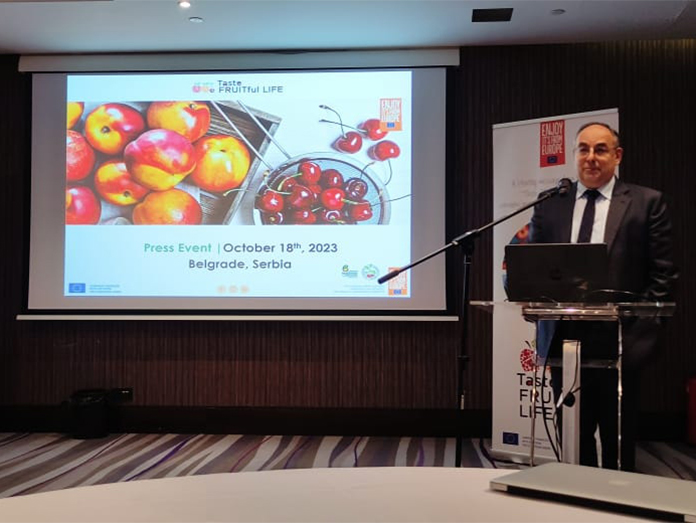A rapidly developing economy, albeit not a member of the European Union yet, Serbia is increasingly inclined towards quality over price, while recognising the EU PGI regime and applying the respective protection on PDO and PGI products. Adding the fact that hundreds of thousands of Serbian tourists are coming to Greece for holidays, most of them repeatedly, meaning that they are very familiar with the local food products, makes it more than obvious that the Serbian market is a paved path for Greek f&b companies. Mr. Antonis Katepodis, Minister Councillor for Economic and Commercial Affairs (ECA) Head of the Economic and Commercial Section of the Greek Embassy in Belgrade, explains in Ambrosia Magazine the dynamics of the brand name “Greece” in the neighbouring Balkan country.
Interview: Charitomeni Vonta
What would you identify as the greatest asset of Greek f&b products in your market?
The biggest asset of Greek food and beverage products is the love of Serbian people for Greece. With the exception of the 2 years covid period, almost 1 million Serbian tourists choose every year Greece for their summer holidays. Returning to Greece at least once per year, and indeed some of them to the same area, has become a tradition for many Serbian families. During this longstanding tradition, Greek f&b products became especially well-known and loved by Serbian people.
On the other hand there is also a significant Greek business presence in Serbia, of around 250 companies, with many of them being active in the f&b sector. Among them there are several Greek Restaurants and Shops and a big Greek Super Market Chain as well. Those companies and shops serve as the best Ambassadors of the around 400 different Greek f&b products that are present in Serbia.
As mentioned before, the brand name of Greece is strong in Serbia – but not only because of its role as memory or souvenir of the nice days spent in Greece during the summertime. Greek food and beverage products identify for their high quality and taste as well as being related to the Mediterranean diet and a healthy lifestyle, which plays an important role in the Serbian idiosyncrasy.
What are the Greek products with the greatest potential, and how could their dynamics improve?
According to official data, the surveys conducted by our office and my experience, I would say that the Greek organic products, olive oil, fresh and frozen fish and wine and Greek distillery products like ouzo and mastic liqueur, and of course feta cheese and greek yoghurt, enjoy a rising momentum in Serbia. Even though, at least for the moment, the consumer purchase power is relatively lower in Serbia than in Greece, Serbian economy is developing rapidly and the Serbian average consumer tends to be increasingly inclined towards quality over price, being more eager to try new and more delicate tastes and experiences. High quality olive oil and organic products are gaining more and more popularity as time goes by. Worth mentioning is the fact that although Serbia is not yet an EU member, recognises the EU PGI regime and applies the respective protection on PDO and PGI products.
Also, the Investment Law foresees the provision of significant incentives (mainly financial and fiscal) regarding the investments in the f&b sector, and especially in the agro-industry and food processing sector. Although Serbia could be considered as the bread basket of the region, in regards to agricultural production (especially fruit production), there is a huge need for improving and modernizing agricultural and mostly processing sectors. In addition organic products production is still in an infantile stage. Thus, the state is seeking for foreign investments in these fields and especially in Southern Serbia.
What is the biggest challenge for companies or brands who want to do business in Serbia?
Serbia is not yet an EU member country, but it is in the process of adapting its legislation to the EU acquis and all EU product safety certificates are recognised. Despite that, local authorities’ efforts to protect vulnerable local producers sometimes lead to the adoption of extraordinary measures. These may be intensification of laboratory tests on imported products, which are quite time-consuming and raise the cost of entering the market, or the adoption of extra import duties for short periods of time on certain products. A recent example of the latter is the raise of milk and dairy extra import duties from circa 30 to 300 dinars (circa 2,5 euros) per litre/kg respectively. Hopefully those measures will be lifted until the end of the year.
Also, some of our products, especially in the food and beverage sector, face strong competition, either from foreign countries (e.g. Italy and Spain for olive oil) or domestic producers (production of dairy). Nevertheless, our efforts towards the recognition of the quality of our PDO and PGI products are continuous and seem to bring results.
How could we improve the position of Greek f&b products and to enhance exports to Serbian market? Please share some targeted actions taken towards this direction.
We assist and support actively every company that is willing to operate or is already active in the Serbian market. Through our contacts in the local market and networking events, we are trying to create synergies between Greek and Serbian companies as well as between other Economic Institutions of both countries.
We also support Greek companies in their effort to access the Serbian market by providing them with both general and targeted information either by conducting sectoral/industry market surveys or by providing information about potential customers. And of course by providing companies with the necessary information on the Serbian legal framework and local market insights.
Moreover we assist Greek companies’, Chamber’s or other Institutions’ Participation in Exhibitions, as well as co-organise events such as Greek Products presentation Days/Week, that will enhance the Greek products and companies visibility and recognition by local customers.
Our Office also co-organizes in collaboration with Greek Chambers or other Institutions, business missions with B2B events, economic fora and conferences. Of course, we remain always open in examining every potential action and event, proposed by Greek Companies and Institutions.
What are the best selling Greek f&b products in your market?
The volume of bilateral trade in goods between Serbia and Greece in 2022 amounted to around 751, 3M euros, recording an increase of 22,48% compared to 2021. More specifically, Greece’s exports to Serbia reached 455,5M euros, while Serbian imports to Greece amounted to 295,7M euro.
Approximately half of it comprises f&Β and agricultural products. The most exported products are long and medium life Greek Dairy (mostly Greek Yogurt and Feta cheese), Fresh Fruits (mainly Citrus Fruits but also melon, watermelon, apricots, cherries, peaches, melons, strawberries, nectarines, plums, grapes, figs), fresh vegetables (tomatoes, cucumbers, potatoes), but also processed fruits (like jams, puree and pastes) and processes vegetables (pickled, frozen, or sauces), of course olive oil and olives, cereals, rice, salt, fish (fresh and frozen), bread, pastry, cakes, biscuits and other confectionary and food preparation products, alcoholic beverages (Wine, Ouzo) and soft drinks and juices as well.
Of course there is a great love for and affinity for the Greek gyros and souvlaki, with Greek gyro shops found in every corner of Belgrade, mainly, but in other major cities too. Regarding drinks, I would say that there is a strong interest for sweet drinks like ouzo and mastic liquor.


















 Charitomeni Vonta Mr. Antonis Katepodis, Minister Councillor for Economic and Commercial Affairs (ECA) Head of the Economic and Commercial Section of the Greek Embassy in Belgrade at the FRUITful Life event, held October 2023, with the scope to promote the Greek peaches, cherries and apples in Serbia.
Charitomeni Vonta Mr. Antonis Katepodis, Minister Councillor for Economic and Commercial Affairs (ECA) Head of the Economic and Commercial Section of the Greek Embassy in Belgrade at the FRUITful Life event, held October 2023, with the scope to promote the Greek peaches, cherries and apples in Serbia.
